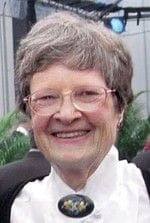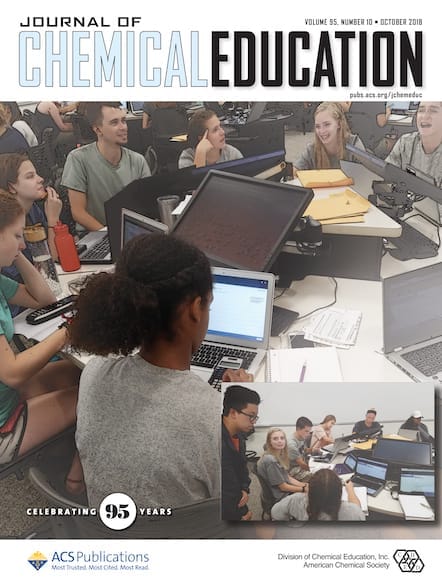The role of research in advancing the teaching and learning of chemistry has a shorter history than other subdisciplines of chemistry. As a younger field, celebrating the impact of early pioneers is best described as nascent at this time. Thus, we arrive at the first Festschrift virtual issue of the Journal of Chemical Education honoring […]


The role of research in advancing the teaching and learning of chemistry has a shorter history than other subdisciplines of chemistry. As a younger field, celebrating the impact of early pioneers is best described as nascent at this time. Thus, we arrive at the first Festschrift virtual issue of the Journal of Chemical Education honoring a pioneer in chemistry education and chemistry education research (CER), Professor Dorothy Gabel.
Professor Gabel studied chemistry at Rosary College in River Forest, Ill., receiving her bachelor’s degree in 1957. She continued her education at Purdue University, working with J. Dudley Herron, obtaining her master’s degree in chemistry education in 1969 and a Ph.D. in 1974 in Science Education. Upon graduating from Purdue, she joined the faculty in the School of Education at the Indiana University Bloomington, where she taught and conducted CER studies until her retirement in 2003. Professor Gabel passed away on October 30, 2020.
As befits her appointment in a School of Education, much of her scholarly work was directed towards the pre-service teaching of teachers, where her research found that for many aspects of chemistry, students could provide memorized answers without knowing foundationally how or even why the answers they obtained were correct. This observation was notably true when considering the particulate nature of matter and how atoms and molecules behave. Her work with this type of observational assessment of student learning helped launch the field of chemistry education research.
Another key aspect of her efforts to educate the educators was building professional development efforts to assist the continual improvement of teaching and learning chemistry. The workshops and programs she devised noted ways for teachers to help students improve their process skills for understanding chemistry.
Looking at the many years and numerous contributions of Professor Gabel to chemistry education, it is clear that her work was both foundational and influenced generations of scholars and teachers. This Festschrift collects articles from the journal that accentuate several themes:
- Chemistry education research
- Particulate nature of matter
- Teaching pre-service teachers
- Professional development programs
- Science process skill development
We have collected articles in each category that are contemporary to the time of the work of Professor Gabel, as well as recent articles that have built on the intellectual legacy she established during her career. Welcome to the first Journal of Chemical Education Festschrift honoring Professor Dorothy Gabel.
Helped Launch the Field of Chemical Education Research
Improving Teaching and Learning through Chemistry Education Research: A Look to the Future
Dorothy Gabel
Journal of Chemical Education 1999 76 (4), 548
DOI: 10.1021/ed076p548
***
Report of the Task Force on Chemical Education Research of the American Chemical Society Division of Chemical Education
Diane Bunce, Dorothy Gabel, J. Dudley Herron, and Loretta Jones
Journal of Chemical Education 1994 71 (10), 850
DOI: 10.1021/ed071p850
***
Research in Chemical Education – the Third Branch of Our Profession
Diane M. Bunce and William R. Robinson
Journal of Chemical Education 1997 74 (9), 1076
DOI: 10.1021/ed074p1076
***
Supporting the Growth and Impact of the Chemistry-Education-Research Community
Deborah G. Herrington, Ryan D. Sweeder, Patrick L. Daubenmire, Christopher F. Bauer, Stacey Lowery Bretz, Diane M. Bunce, Justin H. Carmel, Renée Cole, Brittland K. DeKorver, Resa M. Kelly, Scott E. Lewis, Maria Oliver-Hoyo, Stephanie A. C. Ryan, Marilyne Stains, Marcy H. Towns, and Ellen J. Yezierski
Journal of Chemical Education 2019 96 (3), 393-397
DOI: 10.1021/acs.jchemed.8b00823
***
Chemistry Education Research—From Personal Empiricism to Evidence, Theory, and Informed Practice.
Melanie M. Cooper, Ryan L. Stowe.
Chemical Reviews 2018, 118 (12), 6053 – 6087
DOI: 10.1021/acs.chemrev.8b00020
***
Chemical Education Research in the Laboratory Environment: How Can Research Uncover what Students are Learning?
Mary B. Nakhleh
Journal of Chemical Education 1994 71 (3), 201
DOI: 10.1021/ed071p201
***
Particulate Nature of Matter
Use of the particle nature of matter in developing conceptual understanding
Dorothy L. Gabel
Journal of Chemical Education 1993 70 (3), 193
DOI: 10.1021/ed070p193
***
Understanding the particulate nature of matter
Dorothy L. Gabel, K. V. Samuel, and Diana Hunn
Journal of Chemical Education 1987 64 (8), 695
DOI: 10.1021/ed064p695
***
Misconceptions about the Particulate Nature of Matter. Using Animations To Close the Gender Gap
Ellen J. Yezierski and James P. Birk
Journal of Chemical Education 2006 83 (6), 954
DOI: 10.1021/ed083p954
***
Investigating Students’ Ability To Transfer Ideas Learned from Molecular Animations of the Dissolution Process
Resa M. Kelly and Loretta L. Jones
Journal of Chemical Education 2008 85 (2), 303
DOI: 10.1021/ed085p303
***
Assessing Secondary and College Students’ Implicit Assumptions about the Particulate Nature of Matter: Development and Validation of the Structure and Motion of Matter Survey
Marilyne Stains, Marta Escriu-Sune, Myrna Lisseth Molina Alvarez de Santizo, and Hannah Sevian
Journal of Chemical Education 2011 88 (10), 1359-1365
DOI: 10.1021/ed1002509
***
The Development of the Redox Concept Inventory as a Measure of Students’ Symbolic and Particulate Redox Understandings and Confidence
Alexandra R. Brandriet and Stacey Lowery Bretz
Journal of Chemical Education 2014 91 (8), 1132-1144
DOI: 10.1021/ed500051n
***
The Effect of Viewing Order of Macroscopic and Particulate Visualizations on Students’ Particulate Explanations
Vickie M. Williamson, Sarah M. Lane, Travis Gilbreath, Roy Tasker, Guy Ashkenazi, Kenneth C. Williamson, and Ronald D. Macfarlane
Journal of Chemical Education 2012 89 (8), 979-987
DOI: 10.1021/ed100828x
***
Pre-Service Teachers
The Power of Practice: What Students Learn from How We Teach
Amy J. Phelps and Cherin Lee
Journal of Chemical Education 2003 80 (7), 829
DOI: 10.1021/edo8op829
***
Pre-Service Teacher as Researcher: The Value of Inquiry in Learning Science
Janice M. Hohloch, Nathaniel Grove, and Stacey Lowery Bretz
Journal of Chemical Education 2007 84 (9), 1530
DOI: 10.1021/ed084p1530
***
Pennies and Eggs: Initiation into Inquiry Learning for Preservice Elementary Education Teachers
Donald J. Wink and Jeong Hye Hwang-Choe
Journal of Chemical Education 2008 85 (3), 396-398
DOI: 10.1021/ed085p396
***
First-Year Science Education Student Teachers’ Beliefs about Student- and Teacher-Centeredness: Parallels and Differences between Chemistry and Other Science Teaching Domains
Silvija Markic and Ingo Eilks
Journal of Chemical Education 2010 87 (3), 335-339
DOI: 10.1021/ed8000864
***
Exploring the Information Literacy Needs and Values of High School Chemistry Teachers
Marci Zane and Valerie Karvey Tucci
Journal of Chemical Education 2016 93 (3), 406-412
DOI: 10.1021/acs.jchemed.5b00450
***
What Prospective Chemistry Teachers Know about Chemistry: An Analysis of Praxis Chemistry Subject Assessment Category Performance
Lisa Shah, Jeremy Schneider, Rebekah Fallin, Kimberly Linenberger Cortes, Herman E. Ray, and Gregory T. Rushton
Journal of Chemical Education 2018 95 (11), 1912-1921
DOI: 10.1021/acs.jchemed.8b00365
***
Professional Development
No Teacher Is an Island: Bridging the Gap between Teachers’ Professional Practice and Research Findings
Deborah Herrington and Patrick L. Daubenmire
Journal of Chemical Education 2016 93 (8), 1371-1376
DOI: 10.1021/acs.jchemed.5b00700
***
Chemistry Teacher Isolation, Contextual Characteristics, and Student Performance
Linda Padwa, Angela M. Kelly, and Keith Sheppard
Journal of Chemical Education 2019 96 (11), 2383-2392
DOI: 10.1021/acs.jchemed.9b00392
***
Applying the Next Generation Science Standards to Current Chemistry Classrooms: How Lessons Measure Up and How to Respond
Natalia M. Kellamis and Ellen J. Yezierski
Journal of Chemical Education 2019 96 (7), 1308-1317
DOI: 10.1021/acs.jchemed.8b00840
***
Refocusing Outcome Expectations for Secondary and Postsecondary Chemistry Classrooms
Sarah B. Boesdorfer and Dawn I. Del Carlo
Journal of Chemical Education 2020 97 (11), 3919-3922
DOI: 10.1021/acs.jchemed.0c00689
***
Science Process Skills
Chemistry for gifted children in the intermediate grades
Dorothy Gabel
Journal of Chemical Education 1985 62 (8), 702
DOI: 10.1021/ed062p702
***
Effect of Cooperative Problem-Based Lab Instruction on Metacognition and Problem-Solving Skills
Santiago Sandi-Urena, Melanie Cooper, and Ron Stevens
Journal of Chemical Education 2012 89 (6), 700-706
DOI: 10.1021/ed1011844
***
Positive Impacts Using POGIL in Organic Chemistry
Sara M. Hein
Journal of Chemical Education 2012 89 (7), 860-864
DOI: 10.1021/ed100217v
***
Implementing Process-Oriented, Guided-Inquiry Learning for the First Time: Adaptations and Short-Term Impacts on Students’ Attitude and Performance
Anthony Chase, Deblina Pakhira, and Marilyne Stains
Journal of Chemical Education 2013 90 (4), 409-416
DOI: 10.1021/ed300181t
***
Developing Student Process Skills in a General Chemistry Laboratory
Gil Reynders, Erica Suh, Renée S. Cole, and Rebecca L. Sansom
Journal of Chemical Education 2019 96 (10), 2109-2119
DOI: 10.1021/acs.jchemed.9b00441
***
A Review of Research on Process Oriented Guided Inquiry Learning: Implications for Research and Practice
Jon-Marc G. Rodriguez, Kevin H. Hunter, Leah J. Scharlott, and Nicole M. Becker
Journal of Chemical Education 2020 97 (10), 3506-3520
DOI: 10.1021/acs.jchemed.0c00355
